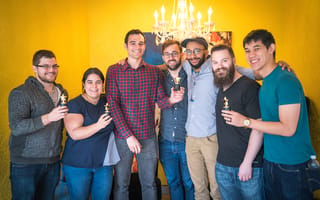A lot can change over the years, as proven by the sheer size of some of NYC’s largest tech startups — but many of these companies were launched by just a handful group of employees.
Though the following companies are now serving thousands of clients and have offices all over the country, they haven’t lost sight of their scrappy, nimble roots. Here’s how five local companies manage to stay true to their original startup culture.

Back in 2004, five college friends started business intelligence software product development company Sisense. Since then, the team has grown to 450 people across three different offices and two countries. Global VP of People Nurit Shiber explained how the company has managed to keep its startup culture over the years.
How would you describe your company’s culture?
We are obsessed with our customers' success, to the point where a manager was found reading up on professional best practices during his time off. We are also innovative — even the smallest of details, like the Sisense-branded socks we give our interview candidates, are unique and true to our culture. Finally, we are open and diverse. Our structure is flat, and Gartner just named us as a top BI company with regards to our number of females in leadership positions.
How have you maintained culture while growing?
Our leadership makes it a point to embody our culture every day and ensure people get the same experience across all of our different offices. We also reinforce behaviors that manifest our innovative and customer-focused culture and make it top of mind for everyone at Sisense. At the end of the day, we are all building this company together.
Healthtech platform Quartet was founded in 2014 with 10 employees. Chief Science Officer David Wennberg joined the team in 2015 and watched it grow to about 150 employees. He explained what the company culture has been like since the beginning.
How would you describe your company’s culture?
Our team is honored, collaborative and ambitious. A powerful example is how our technology engineering teams collaborate with our clinical teams. These people speak completely different languages and come from vastly different career paths, some junior and others with more than 20 years of experience. They are truly humbled to be tasked with fixing one of our country’s biggest social issues. Currently, there is mass collaboration going on across our nationwide teams to expand our notion of behavioral care options, enhance platforming in different intervention models and improve the overall user experience for our patients, doctors and mental health specialists.
How have you maintained culture while growing?
Quartet has gone from 20 employees to more than 150 seemingly overnight, so all of our teams have worked hard to adapt and update to keep our core culture growing strong. We committed very early to building a special culture — one that calls us to be great and ambitious every day and we have an incessant desire to continually and urgently improve. The key to keeping this alive has been transparency and listening to our employees’ needs and trying to deliver on those. We have events like a “founder’s forum,” where new members can freely ask questions about Quartet’s trajectory or debate all sorts of healthcare industry topics with our CEO. There are also weekly town hall meetings to share exciting company updates, product developments and other wins or challenges.

Zipari builds tech products that simplify health insurance carrier's interactions with their customers. It was founded in 2014 with 10 people, and the number has since grown to 95. Director of Marketing Janelle Taylor, who has been with the company for four years, explains what it’s like to work there.
How would you describe your company’s culture?
The Zipari team demonstrates transparency, collaboration and fun every Friday at our weekly roundout, or town hall. We all gather in our theatre, grab a drink and our CEO provides updates on what is going on across the organization from engineering to culture, followed by a product demo. After the roundout, folks hang out for happy hour where we listen to music, play foosball and arcade games, sing karaoke, have food and share plenty of laughs. These roundouts are extremely important for our company because they reinforce our vision and goals and provide the opportunity for people to catch up with coworkers they may not work with on a daily basis. Often times, some people will hang out well into the evening.
How have you maintained culture while growing?
We’re thoughtful about all decisions that affect each member of our team. We have created a culture committee that meets weekly to discuss recruitment, company events, celebrations and any issues that may arise. Employees are able to voice their concerns and ideas through short meetings or "buzzes" with the culture committee chair. This way, we are able to keep a pulse on what’s going on across the company and staff can have their voices heard.
Flexport, a supply chain management solution, launched in San Francisco in 2014. Today, it’s raised $200 million in funding, expanded to 700 employees and opened an office in NYC. Global Account Executive Matthew Wendelken joined the team in 2016 and explained what the culture has been like ever since.
How would you describe your company’s culture?
Our culture is innovative, collaborative and fun.
How have you maintained culture growing?
As we continue to scale, maintaining our company culture becomes more challenging. I think a key part of our success has been simply due to trusting people. Flexport provides a lot of freedom to its people to come up with our own ideas and execute them. I truly feel empowered to make a lot of my own decisions and not wait for permission to try new things — this has fostered a culture of autonomy. Our business continues to be very dynamic, so we try our best to hire open-minded people. We need people with freight expertise, but they also have to have the right mindset. We also do an excellent job of celebrating small wins along the way, making sure to have fun and enjoy the journey as we go.

In 2014, Stride Consulting was founded with five people and has since grown to 60 employees. COO Ken Judy, who joined the team this year, went over the company culture then versus now.
How would you describe your company’s culture?
Stride Consulting employees are inquisitive, collaborative and iterative. We are reorganizing how people manage consultants to better support their long-term growth. We researched alternatives across tech and with competitors, and decided to adopt a career sponsorship model. A subset of our managers worked to define the sponsors’ role, pilot it and identify coaching and leadership responsibilities we need to assign to new roles in our consulting teams. We are now incrementally rolling out these changes to the full company and will continue to experiment, retrospect and adjust as we go.
How have you maintained culture while growing?
We have work to do to maintain it as we continue to grow. At a smaller size, high trust, shared values and high performance arose through close working relationships and shared context. Even at our current size, we need to invest more intentionally in coaching and training. We need more disciplined practices around how we communicate and share knowledge. There’s room for us to be more strategic and efficient with how we use our consultants’ time away from their clients to improve our company.






